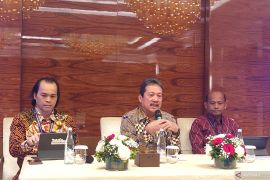"Nevertheless, we believe that Indonesia's industrial sector's export performance will continue to increase after being hit by the pandemic," Ministry's Spokesperson Febri Hendri Antoni Arif noted in Jakarta on Wednesday.
According to Arif, the manufacturing industry sector is still the highest contributor to exports. During the January-April 2023 period, the processing sector contributed US$60.63 billion, or 70.21 percent of the total national exports of US$86.35 billion.
This optimism is also supported by performance indicators for the industrial sector that show positive growth and expansion, Arif remarked.
"Although global economic conditions are still facing challenges, both the Indonesian Manufacturing Purchasing Manager's Index (PMI), released by S&P Global, and the Industry Confidence Index (IKI), launched by the Ministry of Industry, both show levels of expansion," he pointed out.
In April 2023, the non-oil and gas processing industry sector contributed 67.32 percent of the total national exports in April 2023. The main market shares for the non-oil and gas processing industry exports include China, 22.90 percent; the United States, 11.91 percent; and Japan, 5 .85 percent.
Statistics Indonesia (BPS) reported that a decline in the exports of jewelry and valuables and palm oil was the main cause behind the drop in export value of the non-oil and gas processing industry on a monthly basis.
During the same period, the total imports' value also decreased, from US$20.59 billion in March 2023 to US$15.35 billion, a decrease of 25.45 percent. The import value of raw and auxiliary materials in April 2023 fell 23.26 percent (month to month). The value of imports also decreased for all types of imported goods by use, for raw and auxiliary materials, capital goods, and consumption goods.
"Seasonal patterns affect the decrease in the need for raw materials and capital goods for production activities," he explained.
The decline in imports of raw materials could also be caused by global market conditions. This is in line with the decline in export value, especially for export-oriented sub-sectors, such as the textile and textile products (TPT) industry, leather and footwear industry, and furniture industry, he remarked.
Meanwhile, in the plastics industry, raw material imports decreased in April 2023 caused by an increase in synthetic resin imports in the previous month. The increase in imports in March indicated a rise in production levels in the plastic goods industry group that used synthetic resins, coinciding with preparations for Eid al-Fitr 1444 H.
"During this period, producers maximized their production of plastic goods to meet demand, including for the food and beverage industry," Arif remarked.
In facing the condition of declining imports of raw materials, the Ministry of Industry will continue to encourage exports and control of the domestic market. With regard to these declining conditions, data from the industry confidence index (IKI) in April 2023 shows that the percentage of industrial business actors with improving and stable business was recorded at 73.9 percent and combined with a trend of increasing optimism in industrial business actors.
He noted that the ministry also continues to take strategic steps to maintain the market for manufactured products in Indonesia with the downstream policies, encouraging the Increasing Use of Domestic Products (P3DN) program, accelerating the Domestic Component Level (TKDN), and simplifying TKDN certification rules for small industries.
In addition, the government continues to make active efforts to expand exports through bilateral and multilateral cooperation as well as opening export markets to non-traditional countries, he affirmed.
"Cooperation with partner countries and global investors can help Indonesia in entering the global supply chain, increase industrial competitiveness, and open wider foreign markets," he remarked.
Related news: Indonesia destination for global manufacturing investment: Govt
Related news: Hannover Messe chance for manufacturing industry to build brand: envoy
Related news: PMI increase could boost investment: Minister
Translator: Ade Irma J, Resinta S
Editor: Azis Kurmala
Copyright © ANTARA 2023












